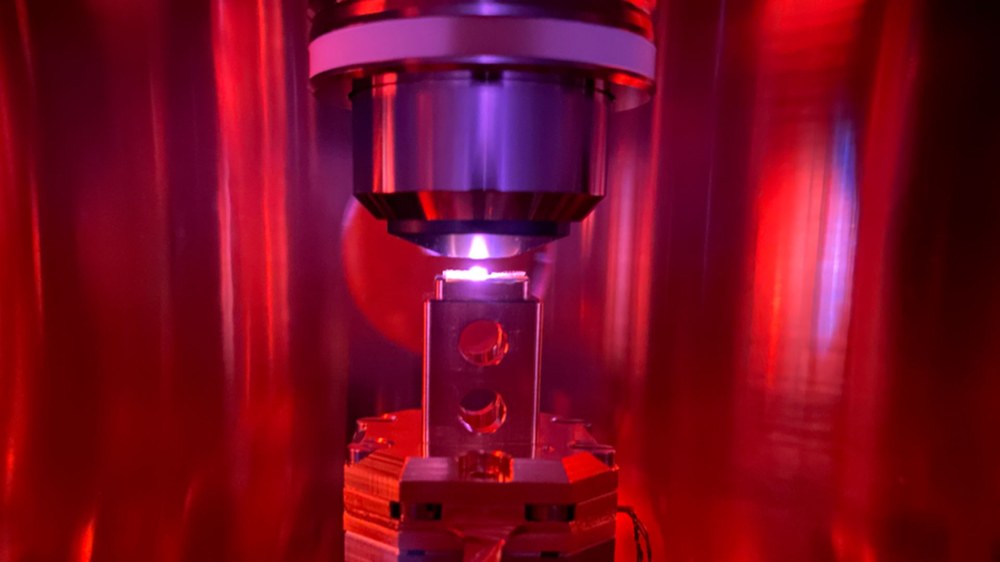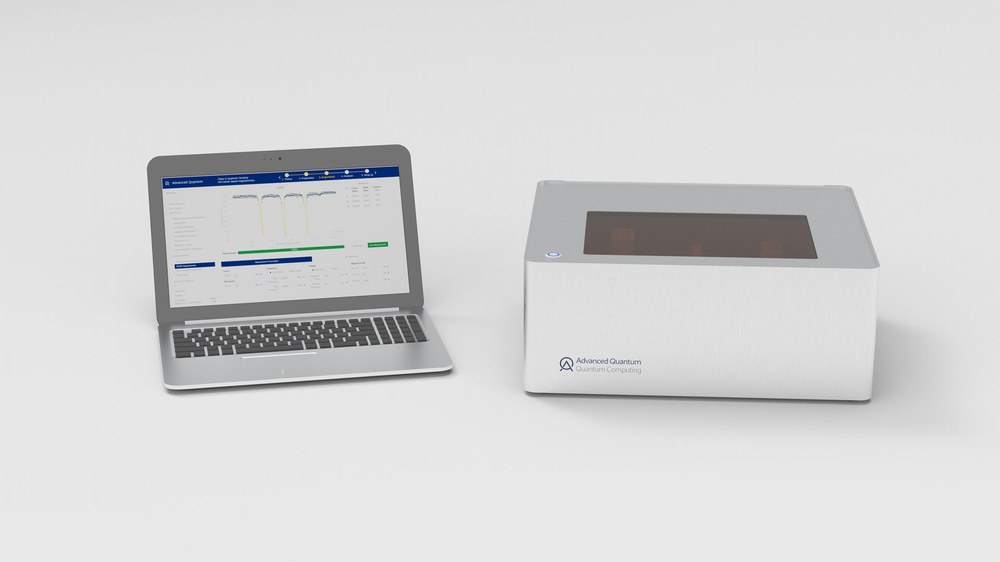Quantum computers – out of the lab, into the world

NVision Imaging Technologies GmbH

Advanced Quantum GmbH
- Advanced Quantum is building a mini-quantum computer for DLR for training purposes, while NVision is developing a quantum computer prototype with at least 50 qubits.
- Both systems work with qubits in crystal structures.
- Advanced Quantum and NVision use laboratories at the Ulm Innovation Center and are expanding the technology portfolio of the DLR Quantum Computing Initiative (DLR QCI).
- Focus: Quantum technology, quantum computing, digitalisation, technology transfer
The German Aerospace Center (Deutsches Zentrum für Luft- und Raumfahrt; DLR) has commissioned a special mini quantum computer to be used for training courses; for future users, students and companies to really touch and try out. The start-up Advanced Quantum from Allmersbach (Baden-Württemberg, Germany) is developing a mobile two-qubit system and a suitable teaching concept to go with it. DLR has awarded another contract to NVision Imaging Technologies from Ulm (also in Baden-Württemberg). NVision will supply a prototype quantum computer that can handle at least 50 qubits (quantum bits). Both Advanced Quantum and NVision rely on 'solid-state spins' as their technological basis.
In this type of quantum computer, computing and memory units are embedded in the crystal structure of solids. NVision uses special 'designer molecules' – carefully tailored molecules – based on crystalline hydrocarbons, to realise 'spin qubits'. Advanced Quantum uses silicon carbide crystals for this, "We are looking forward to welcoming two new project teams to our Innovation Center in Ulm. This not only expands the technology portfolio of the DLR Quantum Computing Initiative, but also the diversity of our ecosystem — locally on site and in Germany as a whole," says Karla Loida, Head of Hardware Projects in the DLR Quantum Computing Initiative (DLR QCI). "With the training system, we are also promoting technology transfer. The two-qubit demonstrator will be used in schools, at trade fairs and by industrial companies to show how quantum computing works, using real qubits and quantum gates instead of simulations."
Crystalline structures in solids protect spin qubits
There are many approaches to the technical realisation of qubits for quantum computers. The DLR QCI is developing systems based on photons, neutral atoms and trapped ions, among other things. These approaches are technologically very different and each has properties that make them more or less attractive for certain applications. The special feature of spin qubits in solid-state structures is their excellent miniaturisation capability and robustness against external interference. This means that this technology can be used to produce ever smaller and denser qubit structures, a prerequisite for quantum computers with large qubit numbers and therefore high computing power.
The fact that solid-state spin qubits are so robust is due to their special physical structure: the crystalline structure of the solid protects the free electrons embedded in them, whose intrinsic angular momentum (spin) is used as a qubit. The two companies commissioned by DLR specifically insert disturbances into the crystal lattice of a solid: individual atoms or molecules that concentrate free electrons at certain points. A spin can be precisely altered by lasers and microwave pulses and – as long as they are close enough to each other – connected to the spins of the surrounding electrons and atoms. This creates arrays of several interacting qubits – the basis for quantum computing.
Computing with electrons trapped in crystals
Advanced Quantum uses silicon carbide crystals for its spin qubits. The two cubit 'mini' quantum computer will be about the size of a moving box. It weighs less than 30 kilograms, can be operated at room temperature and on a table, and only requires an ordinary socket for its power supply.
This demonstrator is designed to show how a quantum computer works. It is suitable for people with no prior knowledge who want to use quantum computers in their everyday work, but also for researchers in quantum physics and interested parties from industry. Advanced Quantum supports this with a concept for an educational course for different target groups, focussing on theory, experiment and personal evaluation. This flexible concept for trade fairs, lectures and training courses is constantly being developed and refined.
NVision is developing a quantum computer with at least 50 qubits as part of the DLR Quantum Computing Initiative. The qubits are located directly in crystalline hydrocarbon compounds. The quantum computer prototype is intended to be scalable and error-correctable. This means that the number of qubits can be increased, and errors can be corrected by the quantum computer itself. The susceptibility to errors is considered one of the biggest obstacles in quantum computing. A well-functioning 50-qubit quantum computer could already be used to test various error correction algorithms. It is also possible to solve the first quantum chemistry problems. In the future, NVision will also demonstrate how the technology can be expanded to more than 1000 qubits.
The two contracts have a total value of 14 million euros.
DLR QCI focusses on diversity
"The DLR QCI is pursuing different technological approaches for qubits in order to research their respective advantages and disadvantages. It is not yet clear which architectures for quantum computers will ultimately prevail – or whether different technologies are necessary for different applications. This is why the DLR Quantum Computing Initiative is focussing on diversity and developing algorithms and software for quantum computers in addition to hardware. In this way, the results of the construction and use of quantum computers are interlinked in one initiative," says Robert Axmann, Head of the DLR QCI. The two Innovation Centers in Hamburg and Ulm are developing quantum computers and the necessary related technologies, software and applications. At the same time, the DLR QCI supports the transfer to markets and lays the foundation for a globally competitive quantum computing ecosystem in Germany.
Advanced Quantum and NVision use laboratories and offices at the DLR QCI Innovation Center Ulm for the development of their quantum computing projects. In the immediate vicinity of the DLR Institutes, start-ups and companies are producing quantum computers based on neutral atoms and nitrogen vacancies in diamond (NV centers), photonic quantum computers, hybrid systems with analogue computers and other spin qubits as part of the DLR Quantum Computing Initiative. The NV centers are also solid-state spins, in this case in diamond crystals. The new contracts will result in valuable synergies. The necessary enabling technologies for spin qubits are being developed in three other DLR QCI projects. Advanced Quantum, for example, is involved in the DLR QCI with the SQuAp project for measuring spin qubits. Advanced Quantum and NVision will also support DLR QCI application projects with their hardware and development work.
The DLR Quantum Computing Initiative
The DLR Quantum Computing Initiative (DLR QCI) involves partners from industry and business, start-ups and research in order to jointly develop quantum computers; enabling technologies, software and applications and the necessary economic environment. The Federal Ministry of Economic Affairs and Climate Action (BMWK) has made funds available to DLR for this purpose. At two Innovation Centers in Hamburg and Ulm, DLR offers quantum start-ups and industrial consortia laboratories, workshops and office space, thereby pooling infrastructure, expertise and resources for effective technology transfer. This creates the industrial basis and the economic environment for quantum computers from Germany, creating a quantum computing ecosystem.
Fast calculations with quantum bits
Quantum computers are an important technology for the future: they can perform certain calculations and simulations much faster or more accurately than conventional supercomputers. For example, they are ideal for tasks in the transport and energy sectors, in logistics and optimisation and for many research-relevant questions, for example in the modelling of complex systems and in fundamental research. As a quantum mechanical universal tool, they will be able to control and network many other quantum technologies. To do this, quantum computers utilise quantum mechanical effects such as entanglement and superposition: Their qubits can assume the states 0 and 1 simultaneously – not just one after the other, as classical computers do. This, in turn, is what makes quantum computers so powerful. There will be a great need for research on and with quantum computers at DLR in the future. In addition, other quantum technologies such as quantum sensors and measuring devices are already being developed for applications in space. Such quantum technologies are among the fundamental and pioneering competences for a future leading international position of German industry.
Advanced Quantum GmbH (Allmersbach, Baden-Württemberg)
Advanced Quantum is a spin-off from the 3rd Institute of Physics at the University of Stuttgart. The young start-up develops and commercialises innovative quantum technologies with a focus on sensor and measurement technology applications. This also includes characterisation setups for spin qubits. In addition to development work, the company offers quantum physics experiments for educational and training purposes at universities and companies.
NVision Imaging Technologies GmbH (Ulm, Baden-Württemberg)
NVision Imaging Technologies, founded in 2015 and currently employing almost 70 people, specialises in quantum technologies and molecular design. NVision has successfully used the manipulation of a five-qubit system to bring molecular MRI probes to market using quantum-based signal amplification for the medical sector. Now NVision has developed a new platform for quantum computing based on optically active spins in organic molecular crystals.
